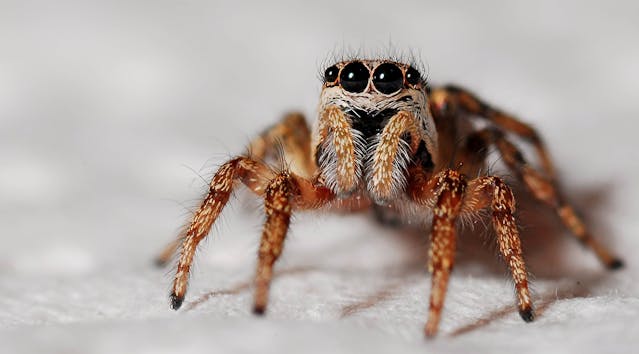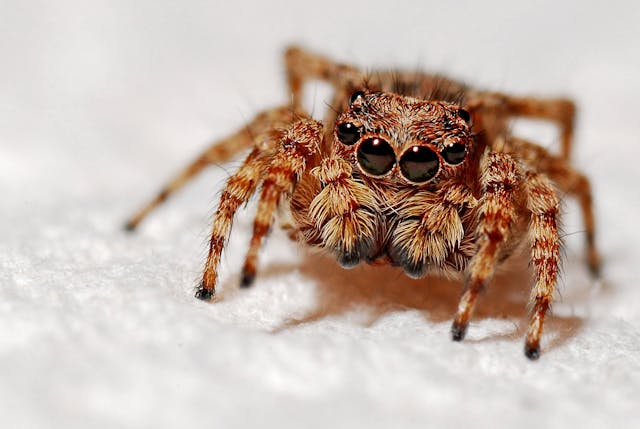Jumping spiders are fascinating little creatures that often capture the attention of homeowners and outdoor enthusiasts alike. With their quick movements, impressive leaps, and those unmistakable large eyes, it’s easy to be curious—or even a bit concerned—about them. One question that tends to come up is, “Are jumping spiders poisonous?”
If you’ve wondered about the risks associated with these spiders, you’re not alone. In this blog post, we’ll break down everything you need to know about jumping spiders, whether they pose any danger, and what to do if you encounter them.
Understanding Jumping Spiders
Jumping spiders belong to the family Salticidae, which includes over 6,000 species worldwide. While most spiders build webs to catch their prey, jumping spiders rely on their agility and sharp vision to pounce on insects.
These spiders are known for their remarkable ability to leap great distances relative to their body size—sometimes up to 50 times their length! Their excellent vision and quick reflexes make them formidable hunters, and they’re often seen during the day, unlike other spiders that are more nocturnal.
But what about their bite? Are jumping spiders poisonous, and should you be concerned if one bites you? Let’s dig into that next.
Are Jumping Spiders Poisonous?
Technically, all spiders are somewhat venomous, meaning they inject venom into their prey to subdue it. However, when people ask, “Are jumping spiders poisonous,” they’re usually asking if these spiders pose a threat to humans. The short answer is no, jumping spiders are not dangerous to humans.
While they do have venom, it is not considered harmful to people. Their venom is specifically designed to immobilize smaller insects and doesn’t have the potency to cause serious harm to humans. In fact, jumping spiders are more likely to retreat or leap away than to bite if they feel threatened.
That said, there are a few things to keep in mind. Like many spider bites, if a jumping spider does happen to bite you, it might cause mild irritation, redness, or swelling at the site, similar to a bee sting. However, this reaction is usually mild and subsides on its own within a few hours or days.
In extremely rare cases, some individuals may have an allergic reaction to spider bites, so it’s always a good idea to monitor any symptoms and seek medical advice if necessary.
How to Identify Jumping Spiders

Jumping spiders are relatively small, usually no more than half an inch in size, with stout, compact bodies. Their most distinctive feature is their large front-facing eyes, which give them excellent vision and a rather cute appearance compared to other spider species.
Here are a few key characteristics to help you identify a jumping spider:
- Size: Most jumping spiders are small, ranging from about 0.1 to 0.5 inches in length.
- Color: They come in a variety of colors, from black and brown to gray and even metallic hues. Some species sport vibrant patterns.
- Eyes: Jumping spiders have eight eyes, with two large, forward-facing ones that give them excellent depth perception and a unique look.
- Movement: True to their name, jumping spiders are known for their leaping abilities. They move quickly and are more likely to jump away than crawl when disturbed.
What to Do If You Find Jumping Spiders in Your Home
If you find a jumping spider in your home, you can usually handle the situation without too much trouble.
Here’s what you can do if you encounter one:
- Relocation: Gently capture the spider using a jar or cup and a piece of paper. Once captured, release the spider outside, where it can continue to hunt other pests.
- Reduce Entry Points: Seal cracks, gaps, and other entry points around windows, doors, and utility lines to prevent spiders from entering your home.
- Regular Cleaning: Keep your home clean and free of clutter, as this reduces hiding spots for spiders. Vacuum regularly, especially in corners, behind furniture, and in basements or attics.
- Consider Pest Control: If you have a large population of jumping spiders or other pests, it may be time to consider professional pest control services like proof. Pest Control.
When to Call in the Experts

While jumping spiders are generally harmless and can be easily managed on your own, there may be times when professional pest control services are necessary. If you notice a large number of spiders in or around your home, or if you’re dealing with other pest issues, it’s a good idea to call in the professionals.
So, are jumping spiders poisonous? The answer is technically yes, but not in a way that’s dangerous to humans. These tiny, agile spiders are equipped with venom to subdue their prey, but they pose no real threat to people.
But that doesn’t mean you have to deal with them in your home!
At proof. Pest Control, we offer expert spider control services to help you maintain a pest-free home. Our team can inspect your property, identify the source of the spider activity, and recommend the best course of action to address the problem.
Contact us today to keep spider infestations at bay!

